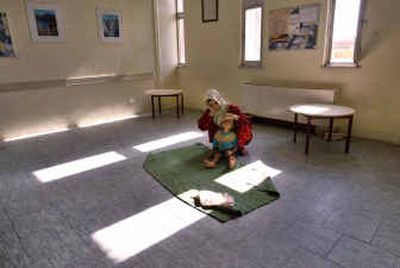Iraqi children going hungry

GENEVA – Malnutrition among the youngest Iraqis has almost doubled since the U.S.-led invasion toppled Saddam Hussein, a hunger specialist told the U.N. human rights body Wednesday in a summary of previously reported studies on health in Iraq.
By last fall, 7.7 percent of Iraqi children under 5 suffered acute malnutrition, compared to 4 percent after Saddam’s ouster in April 2003, said Jean Ziegler, the U.N. Human Rights Commission’s special expert on the right to food.
Malnutrition, which is exacerbated by a lack of clean water and adequate sanitation, is a major killer of children in poor countries. Children who survive are usually physically and mentally impaired for life, and are more vulnerable to disease.
The situation facing Iraqi youngsters is “a result of the war led by coalition forces,” said Ziegler, an outspoken Swiss sociology professor and former lawmaker.
Overall, more than a quarter of Iraqi children don’t get enough to eat, Ziegler told the 53-nation commission, which is halfway through its annual six-week session.
The U.S. delegation and other coalition countries declined to respond to his presentation, which compiled the findings of studies conducted by other specialists.
In reporting the 7.7 percent malnutrition rate for Iraqi youngsters, the Norwegian-based Fafo Institute for Applied Social Science said in November that the figure was similar to the levels in some African countries.
Iraq was generally regarded as having good nutrition rates in the 1970s and 1980s, but problems emerged when the U.N. Security Council imposed sanctions after Iraq’s invasion of Kuwait in 1990.
The United Nations later began an oil-for-food program, which allowed Iraq to sell oil to buy food and medicine. That was credited with nearly doubling the Iraqi population’s annual food intake and halving malnutrition among children.
Ziegler did not mention the role of Iraq’s insurgency in the nutrition problem, something often cited by aid groups.
Late last year, Carol Bellamy, head of UNICEF, said the violence hampers the delivery of adequate supplies of food.
Ziegler also cited an October 2004 U.S. study that estimated as many as 100,000 more Iraqis – many of them women and children – had died since the start of the U.S.-led invasion of Iraq than would normally have died, based on the death rate before the war.
The authors of the report in the British-based medical journal The Lancet – researchers from Johns Hopkins University, Columbia University and the Al-Mustansiriya University in Baghdad – conceded their data were of “limited precision.”